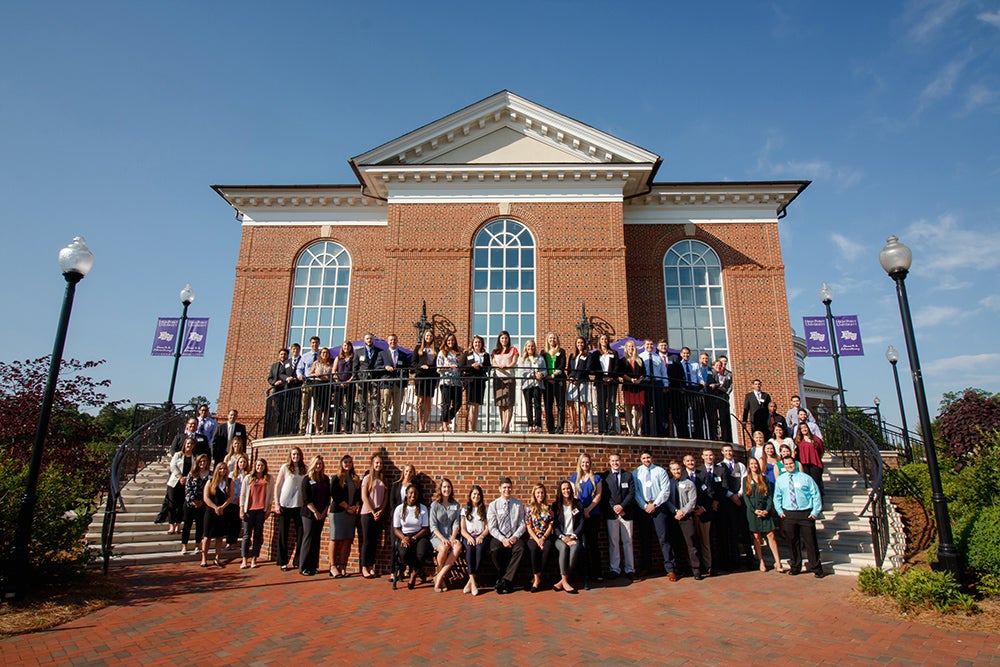High Point University lists growing graduate programs
Published 12:00 am Thursday, June 29, 2017

- HPU’s first physical therapy doctoral class of 60 students arrived in May. Submitted photo
HIGH POINT — Graduate programs in the Congdon School of Health Sciences are flourishing on the High Point University campus this summer with the first-ever physical therapy doctoral students, a new master’s degree in athletic training welcoming its first class, and the physician assistant master’s program welcoming its third cohort while preparing to graduate its first class in August.
Meanwhile, the Fred Wilson School of Pharmacy will enroll 70 new students in the fall. The school officially opened with its first class of 60 students in fall 2016.
“Highly relevant programs continue to expand on our campus, thanks in part to our philanthropic, alumni, parent and student advocates,” says university President Nido Qubein. “HPU is preparing these future leaders to foster innovation and meet the demands of a constantly changing world in health care and beyond.”
First physical therapy doctoral students arrive
Sixty physical therapy students, selected from more than 1,000 applicants, made High Point University history on May 17 when the physical therapy program opened. Daniel Erb, dean of the Congdon School of Health Sciences, and Eric Hegedus, founding chairman of the department of physical therapy, came to High Point from Duke University to build the program.
The students hail from 19 states and institutions including the University of Virginia, Clemson University, James Madison University, Loyola University, Temple University, University of South Carolina and Wake Forest University.
They have begun work in two new, state-of-the-art laboratories: the human biomechanics and physiology lab, which houses a motion analysis lab designed to conduct comprehensive movement analysis of active people; and the virtual reality and clinical gait analysis laboratory, where physical therapy scientists conduct gait assessments of children with cerebral palsy and adults who have suffered a stroke or spinal cord injury. Students are also volunteering to assist children with cerebral palsy at Haynes-Inman Education Center in Jamestown.
According to the Bureau of Labor Statistics, the demand for physical therapists is expected to increase 34 percent by 2024, much faster than the national average.
Athletic training launches 3+2 master’s degree
The Congdon School of Health Sciences is home to a new 3+2 master’s program in athletic training, which allows students to finish a master’s degree in just five years instead of the traditional six years. The first 11 students in the 3+2 track were welcomed on June 1. The program is one of only two 3+2 athletic training master’s degree programs offered in North Carolina. High Point University also offers a traditional two-year master’s program for those who previously earned a bachelor’s degree.
While athletic training has been offered at the undergraduate level at High Point for more than 25 years, elevating the program to a graduate level is important for several reasons, according to Jolene Henning, chairwoman of the department of athletic training. First, the Commission on Accreditation of Athletic Training Education announced a mandate that all accredited programs in athletic training have a master’s degree level. Second, it reflects the high level of skill and care expected from today’s athletic trainers.
“Graduate-level education is necessary as the scope and sophistication of clinical practice for the athletic trainer has expanded, making it difficult to deliver professional education solely at the undergraduate level,” Henning says. “We anticipated this change and began planting the seeds for the 3+2 master’s program in order to facilitate a smooth transition for undergraduate students pursuing athletic training. Elevating this program to the graduate level also allows for interprofessional education opportunities with students in physician assistant studies, physical therapy and pharmacy. Our program offers advanced coursework in gross anatomy with dissection, evidence-based practice, and clinical decision making.”
First physician assistant class set to graduate in August
Also in the Congdon School, the physician assistant studies master’s program welcomed 35 students selected out of nearly 1,200 applicants. The first cohort of students, who began their studies in 2015, will graduate in August.
Physician assistants were established as a profession in the United States 50 years ago.
Demand for physician assistants is expected to grow 30 percent by 2024, much faster than the national average, according to the Bureau of Labor Statistics.
“As our nation faces the biggest changes in health care in a century, High Point University is helping fulfill a vision for both increased access and high quality of care for patients in High Point, North Carolina, and across the country,” says Linda Sekhon, founding chairwoman of the department of physician assistant studies. “The PA profession is attractive for its adaptability to health care needs as well as the opportunity for a PA professional to be employed in primary care or specialties over the course of their career. With an increasing shortage of primary care physicians, aging population and rapid changes in the health care climate, PAs will be needed more than ever.”
Facilities that foster health care innovation
Many of these students began their careers in Congdon Hall, the university’s single largest investment in its history. Construction will be finished in time for fall classes, but already students are using innovative lab and classroom space inside the 224,000-square-foot facility.
The development of Congdon Hall and two new academic schools — the Congdon School of Health Sciences and Fred Wilson School of Pharmacy — housed there represents a total investment of $120 million.
“These programs are significant because they will change lives,” says Erb about the newest graduate-level programs. “Our lab space allows HPU students and faculty to contribute cutting-edge research to the health sciences field, obtain additional research funding and thereby improve the quality of life for those in the Triad and beyond.”




